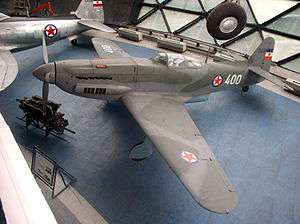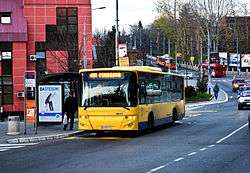Ikarbus
 | |
| Public limited company | |
| Industry | Manufacturing |
| Founded | Zemun, Belgrade, Serbia (1923)(as Ikarus) |
| Headquarters | Belgrade, Serbia |
Area served | Serbia |
Key people | Aleksandar Vićentić (General director) |
| Products | Buses |
Production output | 1,000 buses per year |
| Revenue |
|
|
| |
| Total assets |
|
| Total equity |
|
| Owner |
Privatization Agency (49.40%) BDD M&V Investments (8.91%) Generali osiguranje (5.76%) Others |
Number of employees | 321[1] |
| Website |
www |
Ikarbus a.d. (Ikarbus - Fabrika autobusa i specijanih vozila a.d.) is a Serbian bus manufacturer based in the Belgrade urban municipality of Zemun. The company was originally established as an aircraft manufacturer in 1923, under the name Ikarus – the first Serbian airplane, car and engine industry Kovačević and Co in Novi Sad by Dimitrije Konjović, brothers Dušan and Milivoj Kovačević, Đoka Radulović and Josif Mikl.
The company changed its name to Ikarbus in 1992 due to name usage conflicts with the Hungarian bus manufacturer with the same name.
History


_glider.png)

The first Serbian industry of airplanes, cars and machinery, IKARUS AD was established in Novi Sad in 1923.[2] The firm manufactured a number of foreign designs under licence, such as the French Potez 25, Czechoslovakian Avia BH-33 and English Hawker Fury; Bristol Blenheim as well as the locally-designed Ikarus ŠM; Ikarus IO; SIM-VIII; Ikarus IK-2; Ikarus Orkan. All the company's production facilities were destroyed during World War II, but rebuilt in 1946 and nationalised soon thereafter. Significant post-war aircraft included the Ikarus 451M, Yugoslavia's first domestically-designed and built jet plane (1952), the Ikarus S-451MM that set a world airspeed record in 1957, and the Ikarus S-451M that set one in 1960. After that, aircraft production was relocated to a new aircraft factory SOKO at Mostar, SR Bosnia and Herzegovina.
From 1954 onwards, Ikarus commenced bus production, originally of Sauer and MAN designs under licence, but eventually the company's own designs. In 1992, the company was privatised, and the following year changed its name to Ikarbus.
Timeline
13 October 1923 - the founding meeting of the limited partnership “Ikarus – the first Serbian airplane, car and engine industry Kovacevic and Co”. 20 November 1923 - “Ikarus” starts official business – Dimitrije Konjovic, brothers Dusan and Milivoj Kovacevic, Djoka Radulovic and Josif Mikl registered the company in the Novi Sad District Court. The date is today observed as the founding date.
3 March 1924 - the first school type airplane “Brandenburg” was manufactured
1927 - The Air Command decided that “Ikarus” should start the production of military planes; the factory for the production of military planes was built in Zemun
20 June 1927 - “Ikarus” and the Military and Navy Ministry concluded an agreement to build a new factory of airplane engines in Rakovica
1928 - Sports Club “Ikarus” was established, the first company to build gliders in the country
December 1932 – the company from Novi Sad totally relocated to Zemun
April 1935 - the first model of war airplane of domestic design was completed – a single-seat glider IK-1, designed by engineers Ljubomir Ilic and Kosta Sivcev
January 1936 – Air Command and Ikarus signed an agreement for the manufacturing of British “Hawker Fury” fighter plane, all- metal construction.
Spring of 1938 – Air Command and the company concluded an agreement on the supply of twin-engine bombers “Blenheim”, under the British license
1938 – Administration building of “Ikarus” in Zemun was built
17 April 1941 – Nazi Germany occupation authorities confiscated the company
17 and 25 April 1944 - the factory was heavily damaged in the Allied air-strikes
Early November 1944 - the factory restarted operations
12 August 1945 - the first emergency Assembly of share-holders in the socialist Yugoslavia was held.
27 March 1946 – “Ikarus” was sequestered by the decision of the District Court of Zemun
23 August 1946 – the District Court for the city of Belgrade adjudicated that Konjovic, Lukac and Curcin were guilty of “business collaboration with the occupier”; their shares were confiscated.
22 October 1946 – the first plane “Aero-2B” flew for the first time, the first prototype made by the air industry in new Yugoslavia
23 November 1946 – the District Court for the city of Zemun adjudicated that the entire assets of “Ikarus” be confiscated
23 January 1948 - the Government of the FPRY made a decision to establish the State Enterprise “Ikarus”
1948 – Sports Club “Naša krila” was established
1949 – the prototype of a light multi-purpose bomber “214” was completed, designed by Professor Sima Milutinović
1950 – single-seat fighter plane S-49 was built by engineers Ilic, Sivcev, Zrnic and Popovic
1950 – “Ikarus” manufactured the first gliders in the socialist Yugoslavia; single-seat glider “Hawk 1” was awarded the third prize at the International Championship in Sweden
End of October 1952 – the first Yugoslav jet plane “451 M” took off
1954 – “Kosava” twin-seat glider received the first prize at the International Championship in England
1954 - “Ikarus” manufactured its first bus, under the Austrian license “Sauer”
1957 Airplane S-451MM Matica set the world speed record flying at 750.34 km/hour
1960 – S-451M Zolja, ultra light jet plane set the world speed record, flying at 500.2 km/hour
14 November 1961 – by the official act of the Administration for military industry affairs, “Ikarus” ceased to be a military company. Most of the personal and equipement from the aircraft section of Ikarus had been relocated during the previous decade to a new aircraft factory SOKO.
Products






Every vehicle made by Ikarbus has a name starting with 'IK', followed by a hyphen and then the vehicle's code: IK-1xxs are solo city buses, IK-2xxs are articulated city buses and IK-3xxs and IK-4xxs are coaches. Earlier IK 160(P)/161/166 models are also articulated buses.
Historical models under Ikarus brand
- IK-4 - solo bus based on Leyland chassis, produced in the early 1970s
- IK-5A/5B - articulated on MAN license, produced in the early 1980s
- IK-83 (solo, FAP chassis, FAMOS 2 F-207 engine, manual transmission) - produced in the 1970s
- IK-61 (solo, Raba D2156 engine, manual transmission) - produced in the 1970s
- IK-105/108/110(B)/115 (solo, Raba D2156 engine, manual transmission) - produced until 1988
- IK-160(B)/180 (articulated, Raba D2156 engine, manual transmission) - produced until 1988
- IK-160P (articulated, SW680 engine ) - produced for the Polish market until 1989
- IK-102 (solo, MAN D2866 engine, automatic VOITH transmission) - produced until 1996
- IK-111(B) (solo, MAN D2866 engine, manual transmission) - produced until 1996
- IK-161(B) (articulated, MAN D2866 engine, manual transmission) - produced until 1996
- IK-161R (articulated, Raba D2156 engine, manual transmission) - produced until 1996
- IK-166 (articulated, MAN D2866 engine, automatic VOITH transmission) - produced until 1996
Contemporary models under Ikarbus brand
- IK-101 solo, MAN engine
- IK-102 solo, RABA engine
- IK-103 solo, MAN or Mercedes engine - currently offered
- IK-103 CNG (meets EURO-5 standards) - currently offered
- IK-107 minibus, Cummins engine - currently offered
- IK-112M, MAN NL 323 chassis - currently offered
- IK-112N solo low floor, MAN engine - currently offered
- IK-112LE, Mercedes-Benz OC 500 LE chassis - currently offered
- IK-201 articulated, horizontal MAN engine
- IK-202 articulated, horizontal RABA engine
- IK-203 articulated, horizontal Mercedes engine
- IK-206 articulated, vertical MAN engine - currently offered
- IK-218N articulated low floor, MAN engine - currently offered
- IK-218M articulated low floor, MAN NG 363 chassis - currently offered
- IK-308, midibus coach - currently offered
- IK-312, regional coach - currently offered
- IK-412, long distance coach - currently offered
- IK-415, three-axle coach - currently offered
The letter N disambiguates integral models from non-integral ones.
Aircraft
In 1927 an aeronautical section of the factory was found in Zemun where numerous planes were designed and manufactured, as well as under license. The factory included its own airfield. After the end of the World War II, in 1946, another two aeronautical companies, Zmaj and Rogožarski joined Ikarus as a wholly nationalised state aircraft industry. The Ikarus factory had manufactured in its workshops 475 aircraft up until 1962, when it stopped working for the aviation industry.[2]
- Ikarus 214
- Ikarus 215
- Ikarus 451
- Ikarus 452
- Ikarus Aero 2
- Ikarus IK-2
- Ikarus IO
- Ikarus Kosava
- Ikarus Kurir
- Ikarus MM-2
- Ikarus Meteor
- Ikarus Orkan
- Ikarus S-49
- Ikarus SM
References
- 1 2 3 4 5 Основни подаци из годишњег финансијског извештаја за обвезника ревизије за 2013. годину. Agencija za privredne registre Srbije (in Serbian). Retrieved 8 June 2014.
- 1 2 Yugoslavia - The Aviation Industry at aeroflight.co.uk, retrieved 4-12-2013
- Gunston, Bill (1993). World Encyclopedia of Aircraft Manufacturers. Annapolis: Naval Institute Press. p. 154.
External links
| Wikimedia Commons has media related to Ikarbus. |
- Official website (Serbian)
- English official site